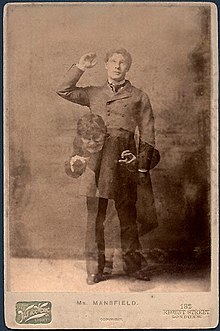Richard Mansfield

Richard Mansfield (May 24 1857-August 30 1907) was an American actor who was born on May 24 1857, in Berlin best known for his performances in Shakespeare plays, Gilbert and Sullivan operas and for his portrayal of the dual title roles in Strange Case of Dr Jekyll and Mr Hyde. His mother was Madame Rudersdorff (1822-1882), the singer, and his father, Maurice Mansfield (d. 1861), a London wine merchant.
Life and career
Richard Mansfield spent his early days on Helgoland, an island in the North Sea, then under British sovereignty, but was educated in Derby, England, and studied painting in London. He traveled to America with his mother, but returned to England at age 20 where his work as an artist would not support him. He was more successful as a drawing-room entertainer, and eventually drifted into acting.
Early career and D'Oyly Carte years
He first appeared on the stage at St Georges Hall, London, and then turned to light opera, joining Richard D'Oyly Carte's Comedy Opera Company in 1879 to appear as Sir Joseph Porter in H.M.S. Pinafore on tour. He would play the leading Gilbert and Sullivan comic "patter" roles on tour in Britain until 1881. Mansfield created the role of Major General Stanley in the single copyright performance of The Pirates of Penzance in Paignton, England, in 1879. In addition to Sir Joseph and the Major General, he also played John Wellington Wells in The Sorcerer beginning in 1880.
He left the D'Oyly Carte organization in 1881, returned to London, and soon made his London debut in Offenbach's La Boulange. After several further engagements in London and following the death of his mother in Boston, Mansfield travelled to America in 1882, where he made his New York Stage debut as Dromez in a D'Oyly Carte production of Bucalossi's Les Manteaux Noirs, followed by the roles of Nick Vedder and Jan Vedder in Planquette's Rip Van Winkle (1882), another D'Oyly Carte production.
Mansfield then appeared in Baltimore as the Lord Chancellor in Iolanthe in December 1882. Two days later, however, he suffered a disabling ankle sprain and had to leave the cast. Returning to New York, Mansfield then began to focus on the legitimate stage. In 1883 he joined A.M. Palmers Union Square theatre company in New York, and made a hit as Baron Chevrial in A Parisian Romance. He returned to Gilbert and Sullivan again to play the role of in Boston Ko-Ko, the Lord High Executioner in The Mikado, in 1886.
Later career
Mansfield was also a theatrical manager, producing Prince Karl and A Parisian Romance in Boston and New York in 1886. He appeared successfully in several plays adapted from well-known stories, and his rendering (1887) of the title-characters in T. Russell Sullivan's Strange Case of Dr Jekyll and Mr Hyde, based on Robert Lewis Stevenson's novella of the same name, created a profound impression. It was with this play that he made his London reputation during a season (1888) at the Lyceum Theatre, by invitation of Henry Irving.
Mansfield produced the play Richard III the next year, at the Globe Theatre. Among his other successes were Prince Karl, Cyrano de Bergerac and Monsieur Beaucaire. He was one of the earliest to produce George Bernard Shaw's plays in America, appearing in 1894 as Bluntschli in Arms and the Man, and as Dick Dudgeon in The Devil's Disciple in 1897. The latter production, in fact, was the first Shaw production to turn a profit. As a manager and producer of plays Mansfield was known for his lavish staging.
It is difficult to overstate Mansfield's popularity and the respect and admiration that he commanded as a Shakespearean actor. At the time of his death, The New York Times claimed that "As an interpreter of Shakespeare, he had no living equal in his later days, as witnessed by the princely grace, the tragic force of his Richard, his thrilling acting in the tent scene of "Caesar," the soldierly dignity and eloquence of his Prince Hal, and the pathos of the prayer in that play. He was the greatest actor of his hour, and one of the greatest of all times."
He continued to perform until just a few months before his death in New London, Connecticut, from liver cancer.
Trivia
Mansfield was preforming in Jekyll and Hyde in London during the time Jack the Ripper was murdering prostitutes. One frightened theater-goer wrote to the police accusing Mansfield because he could not believe that any actor could act so realisticly without being homicidal.
References
- This article incorporates text from a publication now in the public domain: Chisholm, Hugh, ed. (1911). Encyclopædia Britannica (11th ed.). Cambridge University Press.
{{cite encyclopedia}}: Missing or empty|title=(help) - Biography: "Richard Mansfield: The Man and the Actor" by Paul Wilstach (New York, Scribner's, 1908)
- Biography: "The Life and Art of Richard Mansfield" in two volumes by William Winter (New York, Moffit, Yard & Co., 1910)
External links
www.richardmansfield.com
